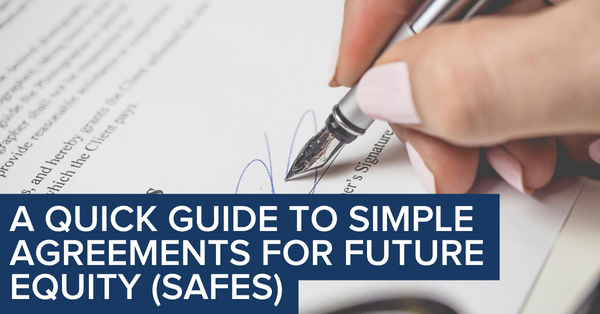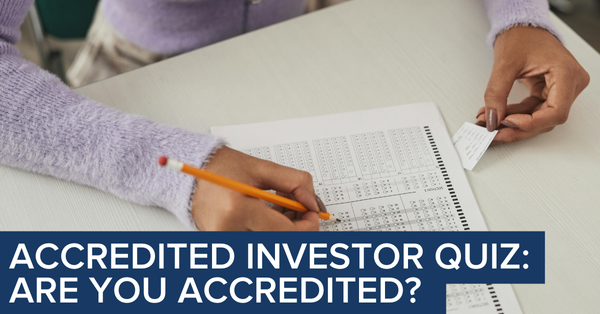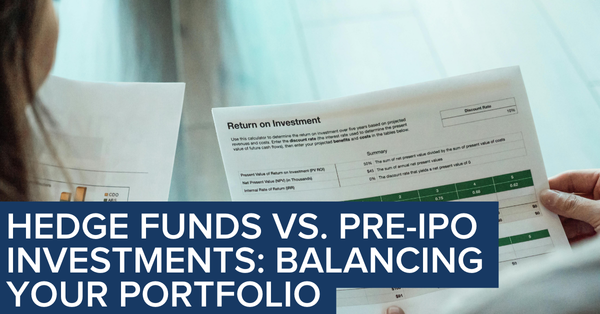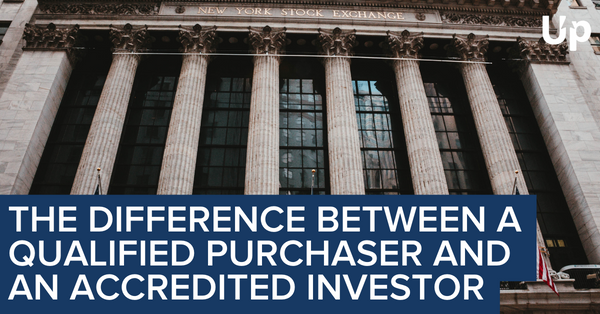Investor Basics: Am I an Accredited Investor?

With an estimated 10.6% of U.S. households qualifying as accredited investors in 2020, it's no wonder more and more people are interested in learning whether they are an accredited investor and what benefits, if any, come with that designation. A primary benefit of accredited investor status is that you can access a larger universe of investment opportunities, specifically securities not registered with the Securities and Exchange Commission (SEC).
In this article, we will help you learn what an accredited investor is, the idea behind such a designation, and specific financial rules to determine if you are an accredited investor.
What Is an Accredited Investor?
An accredited investor is a person or entity with sufficient wealth and income, as deemed by the SEC, to buy high-risk and high-potential-return investments.
The SEC established these rules, in part to assure that only more wealthy and sophisticated investors would be able to purchase unregistered investments. At its core, this rule was made with the intent of protecting the general public from riskier investment opportunities.
Being an accredited investor has a few pros and cons. While the tradeoffs will vary for each investor and specific investment, on average:
Pros
- Access to restricted and unique investments
- Access to different asset classes
- Potential for increased investment returns
- Potential for increased portfolio diversification
Cons
- Often Higher risk investments
- Typically, investments have higher minimum investment amounts like a minimum of $50,000, $500,000, or even $1 million
- These types of investments may be associated with significant and recurring investment fees
- The investments may be less liquid and harder, if not impossible, to sell until some maturity date or designated liquidity event
Not everyone is an accredited investor. The SEC has set clear requirements to ensure that accredited investors are able to bear the risks of unregulated investments. These criteria are outlined below.
How an Individual Can Become an Accredited Investor
According to the SEC on Investor.gov, in order to qualify as an accredited investor, you must fulfill one of the following criteria:
- You must have at least $1 million in total liquid net worth, not including your primary residence, OR
- You must have an annual income of at least $200,000 (or $300,000 when grouped together with a spouse or spousal equivalent) in each of the last two years and expect to earn the same amount or more in the current year, OR
- Hold, in good standing a Series 7, 65 or 82 license (to demonstrate sophistication and knowledge of complex investments)
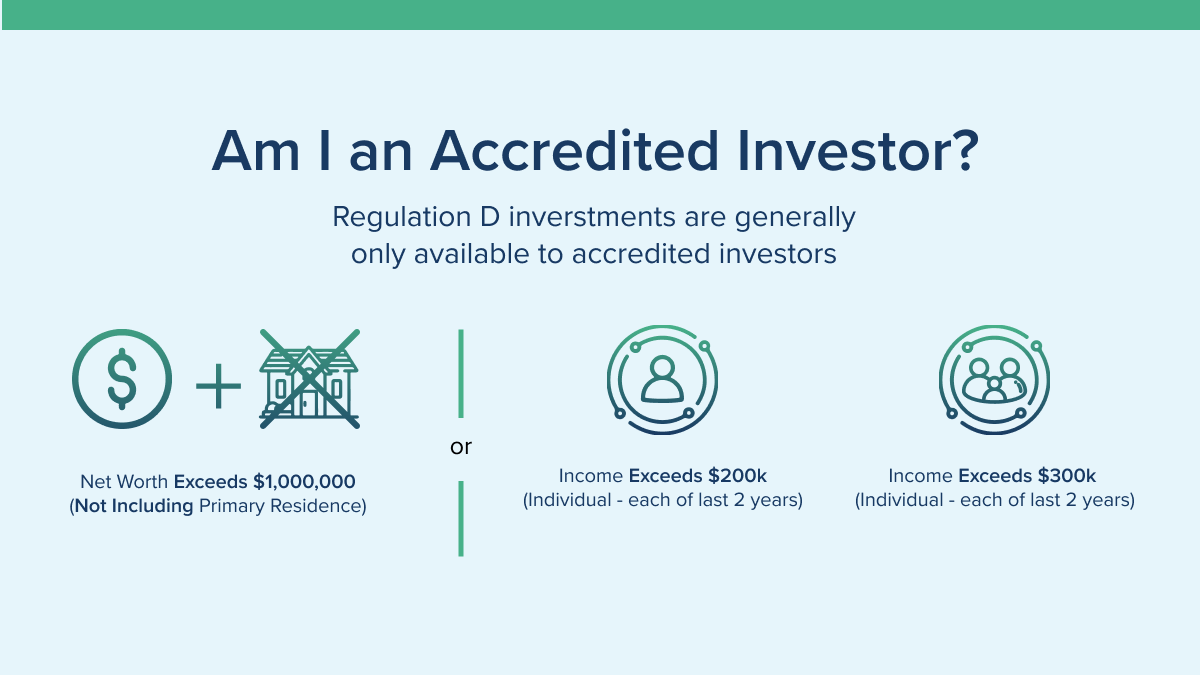
There are additional categories of eligible including being a “qualified purchaser,” which you can read about here. A “qualified purchaser” is someone who is in compliance with Section 230.501 of Regulation D under the Investment Company Act of 1940. Learn more about this rule in the SEC document here.
These requirements help ensure that accredited investors have the financial acumen to make informed decisions and have the means to bear the significant risk of financial loss (Investor.gov).
How Entities, Groups, or Organizations Can Become Accredited
Other than individual investors, entities, groups, or organizations can be considered accredited investors. The qualifications they must meet are different from those of individual investors and depend on the assets or the structure of the entity.
Entities, groups, or organizations can be classified as accredited investors if they meet one of the following criteria:
- The entity, group, or organization has investments in excess of $5 million.
- The entity, group, or organization has assets in excess of $5 million.
- All of the equity owners are accredited investors.
Why Is Becoming an Accredited Investor Attractive?
Being an accredited investor offers a lot of benefits to an individual investor. Here are some of the most attractive ones:
Types of Investment Opportunities
One primary advantage is that you gain access to more investment opportunities. Specifically, you can invest in exempt offerings that do not have to make prescribed disclosures to accredited investors. Because these are seen as high-risk investments, they are not normally available to the general public. These investments include:
- Private placements, including
- Venture capital and private equity funds
- Hedge funds
- Real estate funds
Often these riskier investments will have attractive return profiles, or provide you access to early-stage unproven companies or opportunities. While these opportunities could generate significant returns (like being an early venture capital investor in a company like Google or AirBnB) they also present the opportunity for significant or total loss.
The SEC allows entities, groups, and organizations to avoid SEC registration if they only sell their securities to accredited investors. Although these unregistered securities carry greater risk, they also may have greater potential for growth. Read the SEC's Accredited Investor Definition for more information.
How Do I Become an Accredited Investor?
You don’t get a certificate from the SEC or another government agency when you qualify as an accredited investor.
Generally, when someone seeks to make an investment in a security or securities that are only eligible to accredited investors, the offering party must gather information from the investor to confirm they meet one of the definitions of an accredited investor.
Accordingly, when you make an investment into an exempt offering you should not be surprised if that investment firm requests supporting information like brokerage statements or tax returns to verify that you meet the legal definition of an accredited investor.
Who Determines If I Am an Accredited Investor?
There is no standard method to show your accredited status. As such, companies that offer investments to legitimate investors are obligated by law to take measures to verify your eligibility.
This means that you may need to provide your credit report, financial statements, and/or show that your net worth, or joint net worth if you are married, is at least $1 million.
If you’re not sure whether you meet the qualifications to be an accredited investor, don’t worry. There are resources available to help you figure it out. For one, the SEC has published a helpful guide that covers the requirements in detail.
You can also check with your accountant or talk to a financial advisor. They should be able to tell you if you meet the criteria based on your financial situation.
Expand Your Investment Portfolio by Leveraging Your Accredited Investor Status
Now that you understand what an accredited investor is you can decide if you qualify and if the risk of accessing exempt offerings is worth it to you.
Every investor has different risk tolerance levels so even if you are an accreted investor, there is no obligation that you take advantage of that status to invest in exempt offerings.
You should always make the financial decision most consistent with your long-term investment objectives and, when possible, in consultation with a licensed investment professional who can help inform your investment choices.
All offerings on the UpMarket platform are eligible only to accredited investors, if you have questions about our current offerings or whether you qualify to invest, contact us today.
Disclaimer: Information provided by Upmarket Securities LLC about what is an Accredited Investor is only a summary, and is not intended to be nor should be construed or used as, investment, tax or legal advice, a recommendation, or an offer to sell, or a solicitation of an offer to buy, an interest, directly or indirectly in a product. Any offer or solicitation of an investment may be made only by delivery of Offering Documents and documents attached as exhibits to the Offering Documents. You should rely solely on those documents in making any investment decision. An investment in our products may not suitable for all investors.
About UpMarket
UpMarket's mission is to unlock the private markets for individual investors.
We provide access to a range of asset classes and investment strategies that span private equity, hedge funds, crypto, real estate, and other alternative assets.
The problem
- A large barrier to entry due to high investment minimums
- Time-intensive because sourcing deals is a lot of work even if you’ve got a great network, and
- Costly because of investment-related diligence costs, paperwork, and legal fees
The solution
- Offering lower investment minimums
- Sourcing and conducting diligence on opportunities for investors, empowering them to pick and choose from pre-screened opportunities
- Making the investment process entirely digital, straightforward, and easy to manage from a single portal


